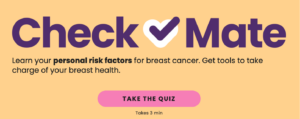Breast Cancer Awareness Month: Exploring the Correlation Between Breast Cancer and Obesity
October 28, 2024
 Approximately 1 in 8 women in the U.S. will be diagnosed with breast cancer in their lifetime. As Breast Cancer Awareness Month comes to a close, women across the country have the opportunity to reflect on how we can better protect ourselves and our loved ones from this disease.
Approximately 1 in 8 women in the U.S. will be diagnosed with breast cancer in their lifetime. As Breast Cancer Awareness Month comes to a close, women across the country have the opportunity to reflect on how we can better protect ourselves and our loved ones from this disease.
While many women might be aware of certain risk factors for breast cancer, like genetics, one area that is often overlooked is obesity. Research shows a correlation between obesity and an increased risk of developing breast cancer. As obesity rates continue to rise, it is crucial to understand this connection so women everywhere can better protect their health.
To learn more, the EveryBODY Covered campaign chatted with our partners at the Brem Foundation to Defeat Breast Cancer. Read our Q&A below:
EveryBODY Covered: What are the risk factors associated with breast cancer? What is the connection between obesity and breast cancer?
Brem Foundation: Breast cancer isn’t a one-size-fits-all disease and not everyone is at equal risk. Risk factors such as family history, breast density or being part of a high-risk group (such as Black or Ashkenazi Jewish women) increase your risk for breast cancer. Additionally, studies have shown that obesity and being overweight are linked with an increased risk of breast cancer, along with an increased risk of over 200 other health complications. Loss of weight in people living with obesity has shown a reduction of risk, particularly for women aged 50 and older. This risk is partially due to the extra estrogen produced by fat cells; higher levels of estrogen increase breast cancer risk. Other factors that contribute to increased breast cancer risk due to increased estrogen levels are hormone replacement therapy, early menstruation, late menopause, and not breastfeeding children, for example.
EveryBODY Covered: How can improved obesity care coverage and access help women protect their breast health?
Brem Foundation: Increased access to obesity care options can directly help women lower their risk for breast cancer and can help address other potential health risks. Bariatric surgery has been shown to reduce overall cancer risk, including hormone-related breast cancer and obesity-related cancer like postmenopausal cancer. To protect breast health, women should have conversations with their doctor to determine a target healthy weight based on age, height, body type and activity level. Together, women and their healthcare providers should develop a safe and sensible plan to manage weight designed specifically based on a patient’s individual needs. Insurance coverage for obesity care is critical for ensuring these critical steps can take place.
EveryBODY Covered: What should women be aware of when it comes to monitoring and protecting their breast health?
Brem Foundation: Although researchers are hard at work, we don’t yet have a way to prevent breast cancer, but we know that early detection saves lives. Over 99 percent of women who receive an early diagnosis can see high rates of survival with treatment.
Breast cancer risk assessments are an effective and important tool to further understand one’s risk for breast cancer. Brem’s CheckMate Quiz can help you learn about risk factors and prepare with questions to ask your doctor to further understand risks (e.g., “I have dense breasts, should I get an ultrasound in addition to my mammogram?” Or, “I have a family history of breast cancer, should I consider genetic testing or getting screened earlier?”). You can take charge of your breast health by using these resources to learn about breast density, how to do self-checks, and breast cancer screening by age.
 To learn more about early detection of breast cancer, visit Brem Foundation’s website.
To learn more about early detection of breast cancer, visit Brem Foundation’s website.